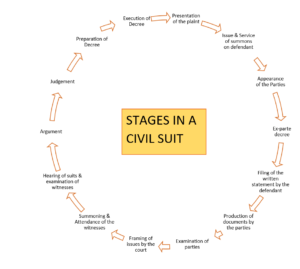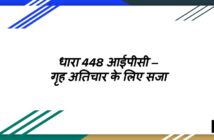Have you heard that a person is summoned to the Court or that the Court has issued a summon? But do you want to know what a summon is and when it is issued? In this article, we will discuss what a summon is, who cannot be summoned, the essentials of a summons, the modes of service of summons, who can receive a summons, and what happens if summon is not received. To read in Hindi click here.
What is Summons?
Summons means to call upon a person. As per Black’s law dictionary, a summons means an order stating an action is commenced against a person in Court.
The main object of issuing summons is to inform the person that a plaint has been filed against him. It is based on the principle of Audi Alteram Partem, meaning hearing the argument of both parties.
The provisions relating to summons are provided under Order V, Section 27-32 of the Code of Civil Procedure.
A civil suit is initiated when a person (plaintiff) claims to have suffered due to the action of another person (defendant) and files a complaint. The intimation called summons is sent to the defendant to appear in Court and defend it. A copy of the plaint should accompany the summon. So, to initiate a civil suit, a summon is issued.
Through a summon, the person is called to appear before the Court at a particular time and place. The Court sends a notice of summoning to the defendant after receiving a plaint against him/her along with the notice of admission of such plaint, the purpose of his appearance and to appear in the Court to reply to the allegations made against him/her in the plaint.
The defendant must appear and reply to the plaint in the form of a written statement within 30 days from the date the summon is served. This period may be extended further at the discretion of the Court; however, the period cannot be more than 90 days.
However, a summons may not be issued if the defendant is present at the plaint and admits the claim made by the plaintiff. In such a scenario, the Court can declare the judgment in favour of the plaintiff.
Let us have a look at the stages in a civil suit with the help of a diagram:

Stages in a Civil Suit
Essentials in a summons/ content in a summons
Order V Rule 1 of CPC has provided the essential condition for the service of summons. The summons should be in writing and duplicate form. It must contain the following –
i) Reason for sending the summons;
ii) Signature of the presiding officer of the Court or any other person authorized by the High Court and seal of the Court;
iii) Specified date and place of appearance of the defendant;
iv) Copy of plaint;
v) Appropriate directions
Mode of service of summons
Service of summons can be done by tendering or delivering a copy of summons signed by the Judge or any other officer along with the seal of the Court. A summon can be issued in any of the following modes –
1. Service by Court – when a suit is instituted, the Court may send a summon to the defendant through the officer of the Court (Belief of Court), which is to be delivered either personally to the defendant himself or his agent (if any) or if the defendant is not available, then the summon will be served on the adult member of defendant’s family. Once the summon is served, the Belief of the Court would take the signature of the person to whom the summon was served and return the original copy to the Court along with the report.
2. Service by Plaintiff (Dasti Summons) – the plaintiff may serve the summons to the defendant with the permission of the Court by making an application. After delivering the summons to the defendant, the plaintiff should also take the acknowledgement of service from the defendant and return the original summons to the Court along with the manner and time of service of the summons. It is also known as Dasti Summons. Suppose the defendant refuses to accept the summons or refuses to sign the acknowledgement of service, or the plaintiff is unable to serve the summon personally for any reason whatsoever. In that case, the Court may re-issue the summons by the Court on an application made by the party to the suit.
3. Personal or Direct Service – where the summons is delivered personally to the defendant or his agent or any other person on his behalf, then the person to whom the summon is served should acknowledge the service by signing the copy of the summons along with the time and manner of service. In case of more than one defendant, a copy of the summons should be served on the defendant
If the defendant or his agent refuses to accept the summons, the Court shall declare the summons as duly served. The summons is deemed to be duly served in the following circumstances –
a) refusal or non-acceptance of summons by the defendant or
b) if the summons was duly served and acknowledged but was lost or misplaced or wasn’t received by the Court within 30 days from the date the summons was issued.
4. Service by Post or courier services – The summons can be served through Registered Postal acknowledgement due or courier service or Speed post in addition to direct service of summon as may be approved by the High Court. The plaintiff will bear the cost of serving a summons.
5. Service through Electronic message – the summons can also be served to the defendant through electronic media such as email or fax for speedy service.
6. Substituted Service (a) without the order of the Court (b) with the order of the Court – When the ordinary mode cannot make the service of summons of service, then the service of summons is substituted for the ordinary mode of service. It can be –
(a) without the order of the Court – if the defendant refuses to sign the acknowledgement of service or if the defendant is absent or is untraceable from his place of residence and there is no other person to whom the summons can be served. Then, in such circumstances, the service officer affixes a copy of the summon at the door of his residence or any other conspicuous part of his house or place of business or work. In such a situation, the service officer will have to report to the Court with the endorsement stating the fact that a copy of summoning is affixed and the reason or circumstances which led to doing so along with the name and address of the person (if any) who identified his place of residence and in whose presence the summons copy was affixed; or
(b) with the order of the Court – when the Court has reason to believe that the defendant is trying to avoid the service of summons, then the Court may direct to serve to summon in the following manner; affixing a copy of the summons at a conspicuous place of the Court, or defendant’s house or by the publication of advertisement in a local newspaper where the defendant resides, works or carry-on business. The service officer shall then return the original summons to the Court along with his report stating the manner and time of service of a summons and the circumstances under which he affixed the copy along with the name and address of the person (if any) who identified the place and who was present at the time of affixing the copy of the summons.
7. Service of Summons in Special cases – a) if the defendant resides outside the jurisdiction of the Court or State, the summon may be served through the Court where he resides. b) if the defendant resides in a foreign country, then the summon may be served through email or fax, or courier, c) if the defendant resides in the Presidency town of Mumbai, Chennai or Kolkata, then the summons may be served through Small Causes Court of that town. d) if the defendant is a public servant, the summons may be served through the Head of the Department where he works. e) if the defendant is a Soldier, sailor, or airman, then the summons may be served through his commanding officer, f) if the defendant is a partnership firm, then the summons may be served through the firm, g) if the defendant is in prison, then the summons may be served through officer-in-charge of the jail.
If the defendant wants to raise any objection to the service of summons, then the same should be made at the earliest or else it will be deemed to have been waived.
Types of summons
There are three types of summons under the law, namely;
- Civil Summons
- Criminal Summons and
- Administrative Summons.
We will discuss the summons under CPC. These are as follows:
Summons to Defendants –
if a suit is instituted against a defendant, a summon is issued to him informing that a complaint has been filed against him, requiring him to appear before the Court and answer the claim.
Service of summons where the defendant resides in another state –
If the defendant resides in another state, a summons may be sent for service in another state’s Court. The Court, upon receipt of such summons, proceeds with the summons as if the summon was issued by that Court and sends a record of the summon given. Suppose the language of the court issuing summons is different from the language of the court sending record. In that case, a translation of the record should be sent.
Service of foreign summon –
Where the provisions of the CPC do not extend to any Civil or Revenue Court established within India, or if the Central Government has declared in the Official Gazette that the provisions of the Code apply to the Civil or Revenue Court within or outside India.
Then, in such a situation, a summons may be sent to the Court within whose territory the Code’s provisions apply. The summons served will be considered as if the Court of original jurisdiction issued it.
Power to order discovery and the like –
The Court may issue a summon for attendance of a person to produce evidence, documents or such other objects as may be necessary for the delivery and answering questions, and order discovery, productions, inspections, admission of documents and facts, impounding and return of documents.
Summons to witness – If the party to the dispute wants to obtain a summon for the attendance of a person as a witness, then a summons is issued to the witness to produce any evidence, documents, or other material objects stated in the summons.
When can a person be ordered to appear personally?
The Court may order the defendant; to whom a summon is issued, to appear –
- in person;
- by a pleader, who is duly instructed and is capable of answering all material questions relating to the suit; or
- by a pleader, along with a person capable of answering all the questions relating to the suit.
The Court may order the defendant to appear personally only if –
- The defendant resides within local limits of the Court’s ordinary jurisdiction; or
- The defendant resides less than 50 miles from the court-house; or
- Beyond jurisdiction but less than 200 miles distance from the court-house, where public conveyance can be availed at 5/6th distance.
However, certain people are exempted from giving personal experience. These include –
- Women who cannot be compelled to appear in public as per certain customs and manner of the country are exempted from appearing personally in Court under Section 132 of CPC. E.g., Pardanashin women and
- Persons exempted under Section 133 of CPC namely; President, Vice President, Speaker, Ministers of Union or States, Judges of the Supreme Court, etc.
Who can receive a summons?
Summons can be received by the defendant, agent, or any other person authorized on his behalf.
Who is authorized to serve the summons?
The summons can be served by –
- Police officer
- An officer authorized by the Court issuing it, or
- Any other public servant.
How to issue summons to a person residing outside the Court’s jurisdiction?
Suppose a person is residing outside the Court’s jurisdiction. In that case, the Court can forward a copy of such summons to the Magistrate where the person summoned resides.
Consequences of Non-compliance with summons/ What happens if a court summons is ignored?
Section 32 of CPC states that if a person to whom summon is issued fails to comply with the summon, then the Court may compel the attendance of such person in any of the following ways –
- Issue arrest warrant;
- Attach and sell the property of such person;
- Levy a fine of not more than Rs. 5000; or
- Mandate him to furnish security for his appearance and, in default, commit him to civil prison.
What happens if the summons is not received?
Suppose the defendant does not receive the summons and a decree is passed against him. In that case, the defendant can apply for rescission of judgment within 20 days from the date the judgment was passed, stating the reason for not defending the matter.
Conclusion
Summons is the initial stage of the proceedings in a civil suit. When a plaintiff files a plaint against the defendant, a summon is issued against him, stating the allegations against him. It contains the date and time when the defendant is required to appear before the Court to answer the plaint. In addition, summons can be issued against a witness to produce pieces of evidence or documents relating to the suit. The summon is based on the principle of Audi Alteram Partem. The defendant must appear before the Court when a summon is issued. Suppose the defendant fails to appear before the Court after receiving a summon. In that case, they will be liable under Section 32 of CPC. Summons in Hindi.

